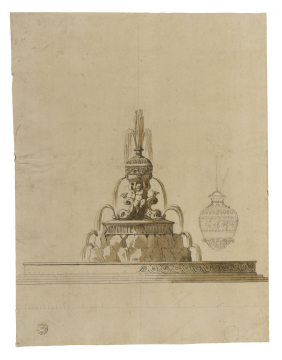Scale
1 inch to 5 ft
Signed and dated
Medium and dimensions
Pencil, pen, brown wash on buff paper
377 x 290
Hand
James Adam, Office of
Notes
This design and that in Adam vol.7/109 are probably both connected with James Adam's Parliament House scheme of 1762/63. Although no fountains appear in the later copy plan in Adam vol.28/3, James Adam wrote in November 1762: 'I have personified the Thames and the Forth, transforming them into fountains at the foot of my great stairs, the former leans on a Lion with a crown of roses, the anchor lies by him and the oak and mistletoe grow by his side. The unicorn supports the Forth with a garland of thistles and rue, from a rock by his side spring the fir and the birch. As I have a great deal of sculpture I have recourse to a good deal of this sort of invention' (J. Fleming, Robert Adam and His Circle in Edinburgh & Rome, London, 1962, p.305). However, a scheme by Adam for a theatre shows at the entrance portico two similar fountains to that shown here, with lion and unicorns beside the lower basin (see Adam vol.7/170 and, in greater detail, Adam vol.7/184, which come close to such ideas). The composition of putti and dolphins is a familiar one and the design may well have been derived from those depicted in the four books by Giovanni Battista Falda (1643-78), Le Fontane di Roma (1675), a copy of which appeared in the Adam sale of 1818 (see Catalogue of A Valuable Collection of Antique Sculpture etc. R. Adam, Christie's, London 21 & 22 May 1818; see also D. Watkin, ed., Sale Catalogues of Libraries of Eminent Persons, Vol. 4, Architects, London, 1972, p.186).
The decorated urn is a version of the three shown as fountains in Adam vol.7/155 and for 'Berkley Square' in Adam vol.7/151, all probably connected with the building of Lansdowne House, Berkeley Square in London, c.1762.
Level
Drawing
Digitisation of the Drawings Collection has been made possible through the generosity of the Leon Levy Foundation
Sir John Soane's collection includes some 30,000 architectural,
design and topographical drawings which is a very important resource for
scholars worldwide. His was the first architect’s collection to attempt to
preserve the best in design for the architectural profession in the future, and
it did so by assembling as exemplars surviving drawings by great Renaissance
masters and by the leading architects in Britain in the 17th and 18th centuries
and his near contemporaries such as Sir William Chambers, Robert Adam and
George Dance the Younger. These drawings sit side by side with 9,000 drawings
in Soane’s own hand or those of the pupils in his office, covering his early
work as a student, his time in Italy and the drawings produced in the course of
his architectural practice from 1780 until the 1830s.
Browse (via the vertical menu to the left) and search results for Drawings include a mixture of
Concise catalogue records – drawn from an outline list of the collection – and
fuller records where drawings have been catalogued in more detail (an ongoing
process).


